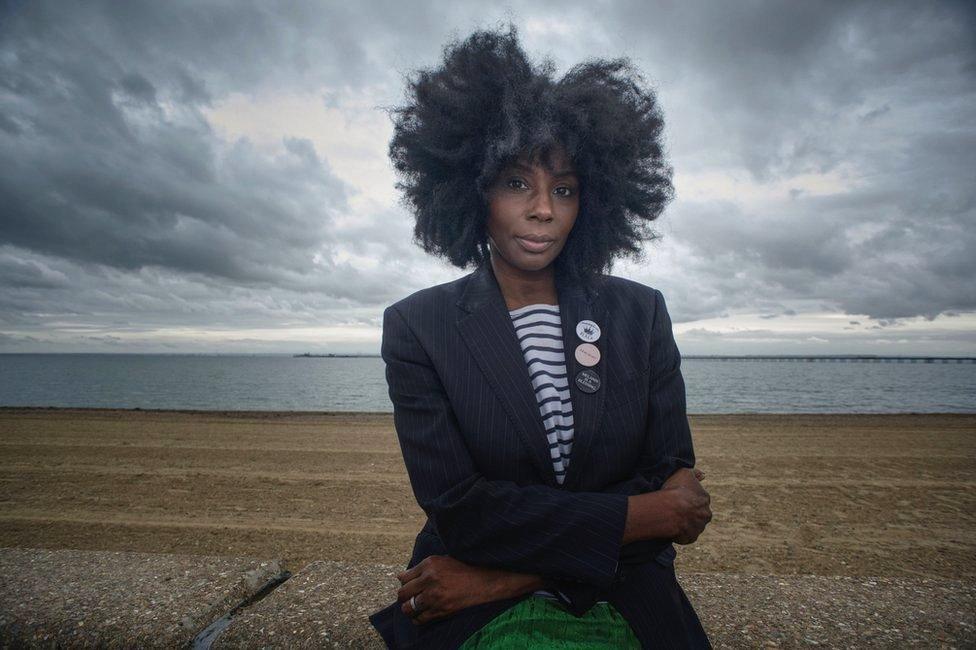Essex and London accents deemed less intelligent, researchers find
- Published

When people heard Dr Amanda Cole's voice they tended to assume she was less intelligent than many of the others they heard during the test
The UK is a rich tapestry of dialects and accents which in turn reflect the ebbs and flow of local history. But why are people with some accents perceived to be less intelligent, friendly or trustworthy than others?
Among the 100 or so recorded voices was one of a young woman from south Essex.
Most of those who listened to the clip felt she was less intelligent than the other voices they heard.
Yet the woman they heard was Dr Amanda Cole, a postdoctoral research fellow at the University of Essex's Department of Language and Linguistics.
Originally from Loughton in south Essex, Dr Cole was the person behind the entire research project.
Dr Cole's study surveyed attitudes among young adults aged 18 to 32 towards accents across the south east of England.
About 200 listeners from a variety of backgrounds were played 10-second clips of speakers reading the same script from across the region, including Berkshire, Buckinghamshire, Hertfordshire, Surrey, various parts of London and, of course, Essex.
"I know people from Essex who moderate the 'Essex-ness' of their accent to get ahead
The listeners were then asked to rate the speakers' intelligence, friendliness or trustworthiness using sliding scales.
"When we hear someone talk we very quickly make judgements about them and group them into categories," says Dr Cole.
"People from Essex and London were judged to be less intelligent than people from other areas.
"In addition, people who are working class (from across all of south east England) were judged to be less intelligent, friendly and trustworthy than middle class people.
"And people from an ethnic minority were judged less intelligent than white people based only on their accent," she says.
She said "negative judgements about working class and ethnic minority people based on their accents" were "compounded if they were from Essex or East London".
"For instance, a working-class person from London or Essex was judged more negatively than working class people from other areas," she said.
"There was this self-bias effect, in which working class people judged other working class people to be less intelligent.
"The same self-bias effect was found for those from an ethnic minority background; they also judged other people from an ethnic minority background as less intelligent than white speakers.
"The self-bias effect shows just how pervasive and entrenched accent prejudice is."

Southend-based artist Elsa James says she knows people who "de-Essex" their voices when going for jobs
Southend-based artist Elsa James says she finds Dr Cole's results fascinating and told how they resonated with her own experiences.
"I know people from Essex who moderate the 'Essex-ness' of their accent to get ahead," she says. "And it is really interesting how Essex people or others are judging people who sound like themselves.
"It happens in black communities sometimes, where people would rather trust somebody who is not black, where people would not trust somebody from your own community, there is something there about distrusting your own."
Mrs James says accents and voices are not always fixed but fluctuate and alter depending on where a person is.
"When I am with my sisters, for example, I am more relaxed and my voice more Caribbean. It changes depending on who you're with and where you are."

Dr Cole says she has been "repeatedly corrected" about her accent
But what are the real-life implications of accent prejudice?
"I'm from Essex and it [my accent] is a real stigma," she says. "At many points in my life, I've been picked up or corrected on my accent. At other times, nothing is overtly said but I am aware that as I talk others are rapidly forming opinions about me which are not always generous."
She says such judgements are not made consciously or intended to hurt other people.
But they could, she says, be "so important" in situations such as job interviews because "if you have an Essex accent, for example, you are already so much on the back foot".
The University of Essex study found:
11%People from Essex were judged 11% less intelligent than those from south west London
14%Working class people were thought to be less intelligent than upper middle class people
5%Women were deemed 5% more trustworthy and friendly than men but 2% less intelligent
Dr Cole says another surprising shift appeared to be the changing perception about working class accents.
She says the results of her study found working class accents were seen as "less friendly and less trustworthy" while "middle class accents were seen as more friendly and trustworthy".
"Previous studies had found working class voices considered more trustworthy and friendly," she says. "Women were generally perceived as marginally less intelligent than men but more friendly and more trustworthy."
So why do such prejudices exist and why would people be prejudiced against their own accent?
Dr Cole says there is a "standard language ideology" which appears to be shared across society and against which accents are judged.
"Those which fit with this standard - which comes to us through various routes including the media, education and parental ideas about "speaking properly" - are judged more favourably than those which do not."
"Standard language ideology is the idea that there is a correct or neutral way of speaking," she says. "This isn't so."
There are no "inherently better" or "more proper ways" of speaking, she says, warning that people are "conditioned" to be believe there are.
"Prejudice towards an accent nearly always reflects societal prejudices towards the groups that speak with that accent," says Dr Cole.
"For instance, if an accent is considered to be lazy, sloppy or incoherent, we often find that this reflects the way that the speakers of that accent are perceived.
"However, in reality accents reflect who we are."

Prof Devyani Sharma says accent bias is reduced when there are real-world implications for the person being judged
The Essex, estuary and cockney accents have been victims of accent bias in UK-wide studies too, says Prof Devyani Sharma, of Queen Mary University London.
She too has found people from working class backgrounds in urban areas such as London, Essex, Liverpool and Birmingham downgrading their accents.
However, she says it is not necessarily a case of people with such accents disliking their own voices. More likely, she says, people downgrade such accents because society as a whole seems to downgrade those accents.
Such self-prejudice, then, is akin to mass peer pressure.
But it gets more complicated when studies involve potential repercussions on those whose accents are being judged, says Prof Sharma.
In one experiment, for example, a recruitment scenario was set up and the listeners were asked to judge the accents of 'candidates'. Accent bias, says Prof Sharma, was less at play in the study because of a "perceived consequence" for the person whose voice was being judged.
You might also be interested in:
Why do we have accent bias at all?
Part of the problem stems from the inherent beauty of accents.
"Accents tell us so much," says Prof Sharma. "They are such rich signals and tell us so much."
Dialects and accents are, she says, a "function of time" that have developed in the UK over hundreds of years into "an amazingly elaborate range".
The downside, of course, is that accents tell another person more than you might wish them to know (or think) about you and your background.

Recruitment expert Miles Lloyd says job applications stripped of names, addresses and background can help diversify shortlists
Miles Lloyd, a director at the Recruitment Society, says: "We all have immediate reactions to other people and humans like to put other people in boxes."
He says recruiters have made significant strides in improving diversity in terms of background, ethnicity, ability, gender and sexual orientation especially but warned the biggest shifts so far had occurred at lower level positions.
"At the top end, however, some of the diversification has been window dressing," he says. "Getting a proper shift at the senior level is much harder."
A key to balancing the playing field, he says, is the use of "redacted applications" in which the employer will not see a candidate's name, age, address or where their qualifications are from.
"By using these types of technologies, you get more diversity in the shortlist and you are selecting people based on who they are rather than what they are," says Mr Lloyd, who is setting up a new business called LevelEqual, which aims to improve diversity at board level in the sports industry.
But accent bias, he says, might still play out - as could other forms of prejudice - at interview.
"You need to stop clients doing one-on-one interviews," he says. "They need to panel interviews and the panel needs to be diverse, the questions put to candidates needs to be the same and answers need to be scored during the interview rather than afterwards.
"We in the UK still have a long way to go but we are so much better than many other places. That said, I still feel we are probably 20 years away from a truly level playing field."

Find BBC News: East of England on Facebook, external, Instagram, external and Twitter, external. If you have a story suggestion email eastofenglandnews@bbc.co.uk